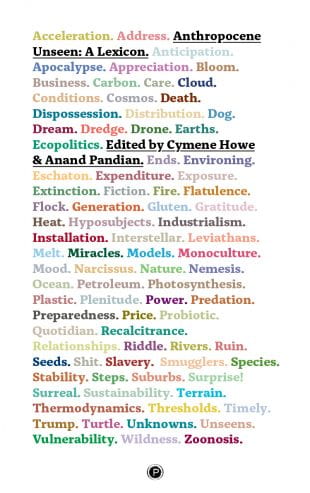New book edited by Rice anthropologist examines era of human impact on Earth
It’s no secret that human behavior is altering the world around us. This geologic era is referred to as the Anthropocene, the age dating from the beginning of significant human impact on Earth and its ecosystems, and is explored in a new book edited by a Rice University anthropologist.
 “Anthropocene Unseen: A Lexicon” (Punctum Books, 545 pages, $26) includes 1,000-word essays from 86uthors, including Rice’s Dominic Boyer, a professor of anthropology, and Timothy Morton, the Rita Shea Guffey Professor of English.
“Anthropocene Unseen: A Lexicon” (Punctum Books, 545 pages, $26) includes 1,000-word essays from 86uthors, including Rice’s Dominic Boyer, a professor of anthropology, and Timothy Morton, the Rita Shea Guffey Professor of English.
The essays explore diverse topics ranging from the current business climate and the U.S. president to various environmental issues. An open-access digital version of the book is currently available for free through Rice’s Fondren Library. To access the book, visit https://bit.ly/2xbAu51.
These essays all have one thing in common: They each propose a different way of understanding and interacting with the world around us, in all of its uncertainty, in this age when humans have an evident and increasingly damaging effect on the planet.
Cymene Howe, an associate professor of anthropology at Rice who co-edited the book with Anand Pandian, a professor of anthropology at Johns Hopkins University, said the idea of the Anthropocene often generates one of two feelings — indifference or hopelessness — as humans come to terms with how they have impacted the world around them.
“There’s a lot at stake in how we understand the implications of this indifference and hopelessness, and how we can move forward while making the future a better one,” she said.
Howe said the purpose of the book is to provide a helpful resource for moving forward in a positive way. The text is a catalog of topics designed to make it easier for readers to understand a wider range of circumstances unfolding in the world around us.
“The Holocene has been a time for humanity to thrive, but the Anthropocene shows us the limits of human interference with natural systems,” Howe said. “These times call for a rebalancing and for better relations between ourselves and our environments. As many indigenous thinkers have taught us, we need to learn to become better ancestors.”
The book’s topics draw from anthropology, literary studies, artistic practice and other humanistic efforts to encourage people to see present-day happenings in different ways and hopefully inspire positive action.
“Viewing a moment in time from different angles can help us to hit pause on our usual routines and get us thinking about new ways of responding,” Howe said. “We need to see the Anthropocene and the climate crisis as an opportunity to think better, to be better and to do better because all our futures depend on it.”
Additional information about the book is available online at https://punctumbooks.com/titles/anthropocene-unseen-a-lexicon/.

